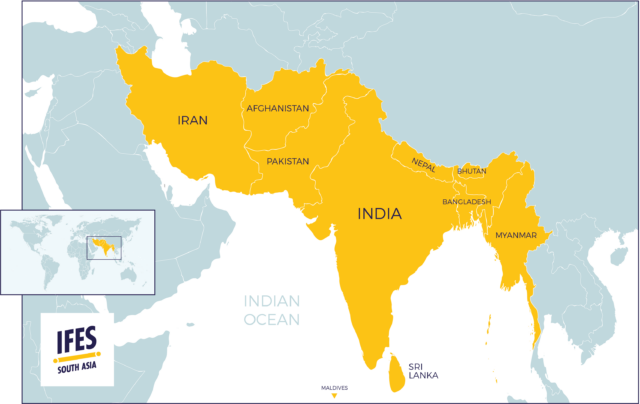By Kamal Sikder
Ever since Sheikh Hasina was ousted from power in Bangladesh by a mass uprising of students and the general populace, Indian media, along with analysts connected to the fallen dictator, have been asserting that this was due to Hasina’s refusal to allow the U.S. to build a naval base on Bangladesh’s St. Martin Island. A few days after taking refuge in India, Hasina allegedly claimed in a statement published by the Indian news portal ‘The Print’ that the U.S. masterminded her overthrow—an allegation that the U.S. has denied. However, Hasina’s son, Sajeeb Wazed Joy, later denied that his mother had made such a claim. It was eventually revealed that Hasina did not send this statement; rather, it was the Indian government sending statements in her name.
Why Is India Taking Such a Stance?
In the shifting geopolitical landscape, Bangladesh has gained significant importance due to its strategic location. China has established the China-Myanmar Economic Corridor, which requires access to the Bay of Bengal. In the event of a conflict, Chinese trade through the Malacca Strait could be blocked due to the presence of the U.S. Navy, and the countries surrounding the strait, including Japan and Singapore, are U.S. allies. Thus, China needs access to the Bay of Bengal to ensure an alternate trade route, which the U.S. aims to obstruct.
Japan is currently building a deep seaport in the Bay of Bengal, specifically in the Matarbari area of Cox’s Bazar district. While the U.S. does not need to establish a permanent naval base in Bangladesh, it wants to ensure that it could have temporary naval access in the Bay of Bengal if a conflict with China arises, which would ensure its dominance and provide a strategic foothold against China. For a long time, China wanted to build a deep seaport in Bangladesh, but due to India’s opposition, it did not get the opportunity to do so. India also wanted to build this port for Bangladesh. However, Sheikh Hasina, choosing not to side with either country, awarded the contract to Japan, a staunch U.S. ally. This decision was a strategic move by the U.S. to play India and ensure American access through Japanese presence in the Bay of Bengal. Furthermore, in recent days, the U.S. has made sure that Japan addresses Bangladesh’s investment concerns in the absence of China if the latter withdraws from investing in the country.
During the Obama administration, the U.S. extended its hand to India, giving it some responsibility in South Asia as part of its China containment policy. Over the past two decades, the U.S. has viewed Bangladesh and other South Asian countries through the lens of India. As a result, India became a member of the Quad, an informal strategic alliance. However, India has struggled in Asia, with almost all countries in the region resenting it and ousting any government sympathetic to it. Historically, India has been a Russian ally. Although during Modi’s previous two terms, India tried to distance itself from Russia and align more closely with the U.S., the Ukraine war caused India to tighten its ties with Russia. Trade between the two countries increased significantly, which angered the West. However, due to India’s large market, the West did not take any punitive actions. Despite Western warnings, India ignored these concerns, and recently Modi visited Russia, prompting the U.S. to issue a statement suggesting it might consider sanctions against India if it continued to do business with sanctioned Russian companies. Modi also visited Ukraine to appease the West.
Against this backdrop, India’s reaction to the regime change in Bangladesh can be explained by its realization that despite being part of the Quad, its importance to the West is diminishing. As China was rising, the West took an indifferent attitude, and now China has become uncontainable for them. The West will not make the same mistake with India and will not allow it to grow unchecked as it did with China. In recent years, despite India’s “Make in India” policy, foreign direct investment (FDI) in the country has been very low. Foxconn, a Taiwanese company that promised to invest billions in setting up a semiconductor manufacturing plant in India, withdrew after several years of operation. The U.S. semiconductor company Micron also pulled out of the country. These companies initially entered India under U.S. instructions and are now leaving due to a changed U.S. directive.
Recently, Indian media reported that a group of U.S. diplomats visited Indian-occupied Kashmir without informing the Indian government, which is unusual because no diplomatic visit can occur without government notification. Also, after Hasina’s fall, there are widespread rumors that India’s Seven Sister states may be severed from the country. A Britain-based think tank issued this warning on August 26, 2024.
It appears that the U.S. no longer wants to rely on India and is taking matters into its own hands. The U.S. Naval Institute published an article titled, “Defense Cooperation and Operational Flexibility: The Case of Bangladesh,” co-authored by Tanvir Habib and Protno Prithu Biswas. According to the article, Bangladesh, situated at the tip of the Bay of Bengal, holds a strategic position that could serve as a vital logistics node for the U.S. Navy in the Indo-Pacific region. Its maritime space, while distanced from the intense conflicts of the South and East China Seas, is close enough to support operations in those areas. The Bay of Bengal’s historical significance and Bangladesh’s untapped naval potential present opportunities for enhanced maritime cooperation.
Bangladesh’s primary naval bases overlook critical regions, including Myanmar’s Rakhine state and the China-Myanmar Economic Corridor (CMEC), which is part of China’s Belt and Road Initiative. By collaborating with the Bangladesh Navy, the U.S. could monitor Chinese activities and strengthen its position in guarding vital trade routes like the Malacca Strait.
Despite promoting a “Free and Open Indo-Pacific,” Bangladesh’s foreign policy emphasizes non-interference and respect for sovereignty. To align more closely with U.S. interests, increased engagement is necessary. Bangladesh’s economy is intertwined with global maritime trade, making the security of sea lanes crucial for both its national interests and those of the U.S.
The Bangladesh Navy has undergone rapid modernization, acquiring equipment from both the U.S. and China, including submarines and advanced naval vessels. While the navy is capable, further integration into U.S. operations could be achieved through training and technology transfers. Bangladesh’s naval capabilities include frigates, corvettes, and large patrol crafts, which are essential for maritime defense and law enforcement.
In times of conflict, Bangladesh’s naval bases could serve as logistical hubs and safe harbors for U.S. Navy operations, enhancing operational readiness. The ongoing development of a deep seaport in Matarbari, with Japanese assistance, could further facilitate U.S. naval operations in the region.
Smaller nations often seek partnerships with larger powers to counterbalance regional threats. Bangladesh’s alignment with the U.S. could provide a counter to China’s influence in Myanmar. With its democratic aspirations and strategic location, Bangladesh represents a promising partner for the U.S. in the Indian Ocean, fostering a relationship that could enhance regional stability and security.
The Future of U.S.-Bangladesh Relations and India’s Decline in Influence
In line with this strategy, the U.S. seeks to establish close ties with Bangladesh while sidelining India, which has deeply unsettled India. This is why various narratives regarding Bangladesh have emerged in Indian media, and recent counter-revolutionary efforts by the judiciary, Ansar, and PDB are related to this concern of India. India, at any cost, wants to prevent this shift and is therefore attempting to destabilize the country to reinstate the fallen dictator Sheikh Hasina, who is currently undergoing debriefing in India. If the U.S. can secure direct access to Bangladesh, there will be little need for reliance on India. Indian authorities are aware of this, which is why their Prime Minister recently visited Russia in an attempt to play both sides, but this strategy failed. Narendra Modi personally called President Biden to debrief him about the visit, and Modi unnecessarily tweeted about Bangladesh, which was quickly debunked by the White House.
Furthermore, the U.S. is actively planning to establish a separate state in Rakhine, which could be easily achieved if the U.S. can use Bangladesh’s naval facilities. Since Rakhine is connected to Myanmar by a narrow corridor, blocking access to it could completely sever Rakhine from Myanmar. Establishing a no-fly zone would ensure this separation. Additionally, creating a Christian state in the Northeast region of India has been a long-term goal of the West, ensuring a permanent Western base, which is still a possibility on the agenda.
There is no reason for the U.S. to establish a permanent base in Bangladesh, as the country does not want to spend billions of dollars on maintenance when it can achieve similar objectives by using Bangladesh’s naval facilities. The article from the U.S. Naval Institute has suggested exactly this strategy, which will likely materialize in the near future. Thus, India’s days of dictating Bangladesh are over, and its dream of economic advancement has also ended. Sixteen years of Sheikh Hasina’s rule allowed India to avoid spending billions of dollars to protect its Northeast region, which historically was never a part of India but was incorporated due to British conquest.
- Kamal Sikder is a UK Data Scientist, Journalist and TV Presenter.










